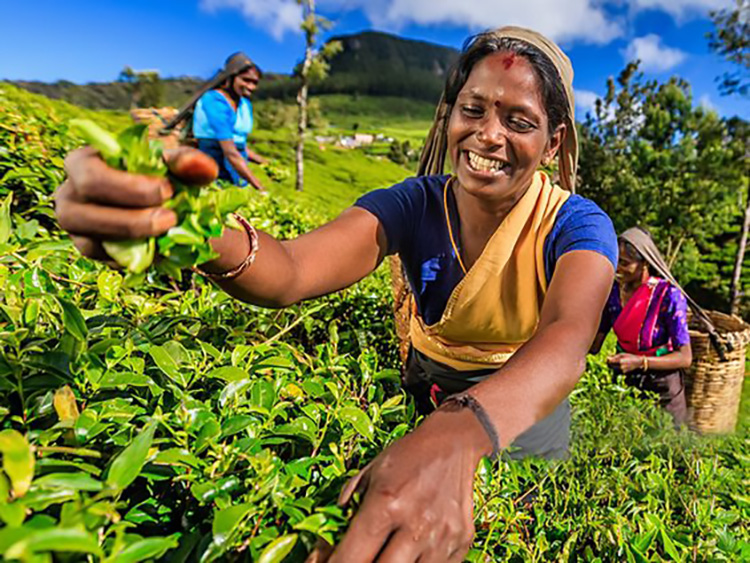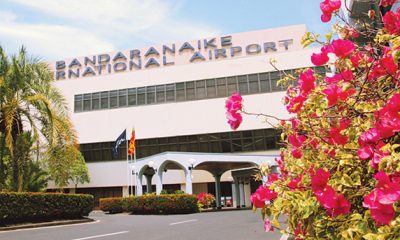Business
Public tug of war on wage hike for plantation sector workers

Planters’ Association says it’s an arbitrary, reckless decision by the government
They reiterate their commitment to a productivity-linked wage model
Warns against any attempt at expropriation by the government
The plantation industry raised its strongest possible objections to the government’s arbitrary, reckless, unilateral decision to drastically hike minimum wages for tea and rubber sector workers by an unprecedented 70%.All producer stakeholders issued a unified warning against the devastating impact the latest increase would have on the plantation sector, leading crippling operational challenges, ultimately leading to severe economic instability for the nation.
“This decision was made without proper consultation or consideration of the needs of all industry stakeholders. In particular, it fails to provide any consideration and threatens to cripple every segment of the Sri Lankan tea and rubber industry. This current effort to force such a clearly unsustainable mandatory minimum wage on tea and rubber smallholders and the Regional Plantation Companies (RPCS) is impossible for the industry to absorb, even with radical cuts to basic operational necessities. The continuity of the entire plantation sector is now at risk, and most critically the livelihoods of the very workers and communities who are connected to the industry across Sri Lanka,” The Planters’ Association of Ceylon stated.
As a result of the decision, the cost of production for tea and rubber is set to rise dramatically, with estimates indicating a minimum 45% increase in the cost per kilogram of tea. This surge in operational costs will render Sri Lanka’s tea and rubber industries uncompetitive in the global market, further exacerbating the financial strain on these sectors.
Additionally, the wage hike will place an enormous burden on Regional Plantation Companies (RPCs), which will face an annual increase in excess of Rs. 35 billion inclusive of EPF/ETF and gratuity payments. This financial strain is unsustainable and threatens the livelihoods of thousands of workers in the plantation sector.
The PA also noted that the current approach of the Government in attempting to coercively set wages for the private sector, and interfere in management of the sector from key Government figures represent a stark violation of the terms of the IMF agreement, which is crucial for Sri Lanka’s economic recovery. This decision is very clearly driven by short-term populist politics aimed at securing electoral victories rather than fostering long-term economic health of the industry, and securing the interests of workers.
The IMF’s $3 billion Extended Fund Facility (EFF) for Sri Lanka is contingent on several stringent conditions aimed at ensuring fiscal consolidation including reduced intervention in state-owned enterprises (SOE). Historically, state control over enterprises has led to inefficiencies and financial burdens, as evidenced by the failures of numerous state-run businesses in Sri Lanka.
Historically, the state has consistently failed to manage State-Owned Enterprises (SOEs) effectively, leading to steep losses and in many instances, near total collapse. By the time of privatization in 1992, state owned plantations made continuous losses that had to be heavily subsidized by the Government up to Rs. 5 billion per year which was borne by the Treasury.
A further Rs. 8 billion was owed by the JEDB and SLSPC to the Bank of Ceylon and Peoples’ Bank as a result of a US$ 300 million lending facility which was extended to the state plantations by the World Bank. While these funds were intended for the improvement of the plantations industry, there were no significant improvements and the plantations did not have the ability to repay the debts, and the Government was eventually compelled to absorb this debt.
Following privatization, worker wages appreciated sharply, and with a significantly larger workforce of 327,123 within the RPC sector the industry was able to operate more effectively, investing substantially towards the development of the industry, including all of the key certifications and standards that have allowed Pure Ceylon Tea, and rubber to maintain a reputation for unmatched quality relative to global competitors.
These efforts have led to improvements in efficiency and productivity, which are now at risk due to the proposed wage hike. It is also important to note that all these companies are publicly traded companies listed on the Colombo Stock Exchange. Any attempt at a second and immediate expropriation by the Government will therefore contravene Securities and Exchange Commission and SEC rules, the Companies Act and other related statutory provisions.
Such an arbitrary and impractical decision also risks severe damage to local and foreign investor confidence alike. The PA warned that this would have negative consequences beyond the plantation industry, especially at a time when Sri Lanka desperately requires foreign direct investment to help boost strategically important sectors in manufacturing and services, as well as the agriculture sector.
The PA has long advocated for a shift to a productivity-linked wage model or a revenue share model, which aligns worker compensation with productivity and revenue earned at auction. This approach not only incentivizes productivity but also ensures a fair and sustainable wage system for workers. Already workers under revenue share under the previous wage structure recorded earnings in excess of the minimum wage that was recently gazette.
The current daily attendance-based minimum wage model is outdated and does not reflect the realities of the modern plantation industry. Any disruption to production or quality standards could send shockwaves through export markets, diminishing export revenues and competitiveness.
“We urge policymakers to prioritize long-term economic stability over short-sighted decisions and to consider the industry’s proposals for a productivity-linked wage model,” the PA said.
Business
Dr RAD Jeewantha named most innovative dentist of the year

Dr. R. A. D. Jeewantha was honoured as the Most Innovative Dentist of the Year at the Business World International Awards, 2025. Organised by the Business World International Organisation, the award ceremony was held recently at the Mount Lavinia Hotel. A graduate of the Faculty of Dental Sciences, University of Peradeniya, Dr. Jeewantha has built a reputation as one of Sri Lanka’s most respected and forward-thinking dental surgeons. After gaining vital experience in Government hospitals, including the Teaching Hospital in Karapitiya, he also served at a leading private hospital before launching his own practice—Doctor J Premium Dental Care in Delkanda, Nugegoda.
His dental clinic is known for offering advanced, patient-focused treatments in restorative dentistry, cosmetic procedures, and implantology, using state-of-the-art technology. Dr. Jeewantha is especially skilled in dental implants, having completed the American Residency Course in Dental Implantology at Roseman University, accredited by the American Academy of Implant Dentistry. Dr. Jeewantha holds fellowships from the International College of Continuing Dental Education (FICCDE) and the Pierre Fauchard Academy (USA). His advanced skills include modern root canal treatments using Mineral Trioxide Aggregate (MTA) for both surgical and non-surgical procedures.
He has completed international trainings in digital dentistry, full-arch implantology techniques like All-on-Four and Zygomatic Systems, and smile design using digital 3D scans. He has participated in global dental events such as the Asia-Pacific Dental Congress and completed training at institutions including the University of Manchester and North Western State Medical University in Russia. His courses have covered everything from intraoral scanning to managing tooth wear. He has previously received many local and international awards. Dr. Jeewantha also serves the community as a Justice of the Peace for All Island.
Business
IIHS Foundation in Biological Studies offers fast-track route to global health careers

The Foundation in Biological Studies at IIHS provides a unique alternative for students looking to fast-track their health careers after their Ordinary Level (O/L) exams. This programme offers a direct route to global health careers, bypassing traditional A/Ls. With over 1,000 students already advancing to universities in Australia, the UK, and Finland, IIHS has positioned the course as a reliable launchpad for careers in fields like medicine, nursing, biomedical sciences, and digital health. “This programme is a game-changer, offering a transformative journey into global healthcare education,” said IIHS CEO Dr. Kithsiri Edirisinghe.
Business
Seylan Bank Reports Strong Growth in Q1 2025 Financials

Seylan Bank has recorded a Profit before Tax (PBT) of LKR 4,199 million in Q1 2025, marking a 13.36% growth compared to LKR 3,704 million in Q1 2024. Profit after Tax (PAT) rose by 20.29%, reaching LKR 2,761 million, up from LKR 2,295 million in the corresponding period of 2024.
Despite a decrease in net interest income by 8.37% due to market interest rate reductions, the bank’s net fee-based income grew by 13.83%, driven by fees from loans, cards, remittances, and other services. Total operating income for the quarter was LKR 11,258 million, a 3.83% decrease from the previous year, while operating expenses rose by 4.62%, largely due to increased personnel and other operating costs.
Impairment charges were significantly reduced by 83.17%, totaling LKR 262 million, reflecting the bank’s solid credit quality and proactive provisions. The bank’s impaired loan ratio improved to 1.98% from 2.10% in Q1 2024, with a provision cover ratio of 80.74%.
Seylan Bank’s total assets grew to LKR 785 billion, with loans and advances reaching LKR 469 billion and deposits totaling LKR 647 billion. The bank’s capital adequacy ratios remained strong, with the Common Equity Tier 1 Capital Ratio at 13.67% and Total Capital Ratio at 17.64%.
In addition to its financial performance, Seylan Bank continued its commitment to education, opening 16 more “Seylan Pahasara Libraries,” bringing the total to 281 libraries across the island.Fitch Ratings upgraded Seylan Bank’s National Long-Term Rating to ‘A+(lka)’ with a Stable Outlook in January 2025, further underscoring the bank’s financial stability and growth trajectory.
-

 Features6 days ago
Features6 days agoRuGoesWild: Taking science into the wild — and into the hearts of Sri Lankans
-

 News5 days ago
News5 days agoOrders under the provisions of the Prevention of Corruptions Act No. 9 of 2023 for concurrence of parliament
-

 Features7 days ago
Features7 days agoNew species of Bronzeback snake, discovered in Sri Lanka
-

 News5 days ago
News5 days agoProf. Rambukwella passes away
-

 Business17 hours ago
Business17 hours agoPick My Pet wins Best Pet Boarding and Grooming Facilitator award
-

 News7 days ago
News7 days agoPhoto of Sacred tooth relic: CID launches probe
-

 Opinion6 days ago
Opinion6 days agoSri Lanka’s Foreign Policy amid Geopolitical Transformations: 1990-2024 – Part IX
-

 Features7 days ago
Features7 days agoSri Lanka’s Foreign Policy amid Geopolitical Transformations: 1990-2024 – Part VIII
























